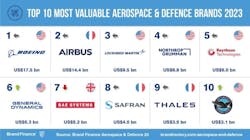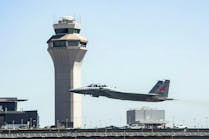Boeing and Airbus Maintain Dominance at the Top of Global Aerospace & Defense Industry
Boeing (brand value up 13% to $17.5 billion) remains the most valuable aerospace and defense brand in 2023. Demand for commercial aircraft increased following a return to global travel, post COVID-19. This has helped sustain Boeing’s brand value growth, which is 4% higher than its main competitor Airbus (brand value up 9% to $14.4 billion). Boeing’s brand value does however remain 23% lower than its pre-pandemic value.
Every year, leading brand valuation consultancy Brand Finance puts 5,000 of the biggest brands to the test, and publishes over 100 reports, ranking brands across all sectors and countries. The world’s top 25 most valuable and strongest brands in the aerospace and defence industry are included in the annual Brand Finance Aerospace & Defence 25 2022 ranking.
Savio D’Souza, Valuation Director, Brand Finance, commented: “Demand for Boeing’s products continues to go up post-pandemic, bolstered by some important partnerships. This included Air India’s selection of up to 290 Boeing jets to expand its future fleet, and the US Air Force awarding a number of high-value contracts to Boeing. Such contracts will be vital as the brand looks to sustain healthy brand value growth going forward and aim to surpass its pre-pandemic level.”
Airbus overtakes Boeing to become the strongest brand with AAA- rating
In addition to calculating brand value, Brand Finance also determines the relative strength of brands through a balanced scorecard of metrics evaluating marketing investment, stakeholder equity, and business performance. Compliant with ISO 20671, Brand Finance’s assessment of stakeholder equity incorporates original market research data from over 150,000 respondents in 38 countries and across 31 sectors.
Airbus (brand value up 9% to $14.4 billion) has overtaken rival Boeing to become the strongest aerospace and defense brand. Its Brand Strength Index Score was 82 out of 100, up 3.4 points year-on-year, with a corresponding AAA- rating. The French brand is also the second most valuable brand in the ranking.
German brands Rheinmetall and MTU are the fastest growing brands
German arms manufacturing company, Rheinmetall, has seen the fastest year-on-year brand value growth in the ranking of 33% to $1.1 billion. The brand’s military arm has achieved particular success in 2022 as a result of increased global defense spending in relation to Russia’s ongoing invasion of Ukraine. This is a common theme for other defense focused brands, such as Northrop Grumman (brand value up 7% to 6.8 billion).
Fellow German brand MTU followed closely behind as the second fastest growing aerospace and defense brand with a brand value growth of 32% to $1 billion. MTU sustained a high order backlog at the end of 2022, highlighting evidence of the sustained demand for the brand’s products, reflecting the pick-up in global air traffic and the confidence placed in MTU by stakeholders.
Boeing and Airbus have the two highest Sustainability Perceptions Values
As part of its analysis, Brand Finance assesses the role that specific brand attributes play in driving overall brand value. One such attribute, growing rapidly in its significance, is sustainability. Brand Finance assesses how sustainable specific brands are perceived to be, represented by a "Sustainability Perceptions Score." The value that is linked to sustainability perceptions, the "Sustainability Perceptions Value," is then calculated for each brand.
Boeing and Airbus had the two highest Sustainability Perception Values of $450 million and $399 million apiece. While both brands’ position at the top of the Sustainability Perceptions Value table is not an assessment of their overall sustainability performance, it rather indicates how much brand value the brands have tied up in sustainability perception. Boeing and Airbus also had solid Sustainability Perception Scores of 4.06 and 4.37 out of 10 respectively. Both brands have particularly focused on reducing carbon emissions, looking to invest and innovate in clean technology and set commercial aviation on course for net-zero carbon emissions.



